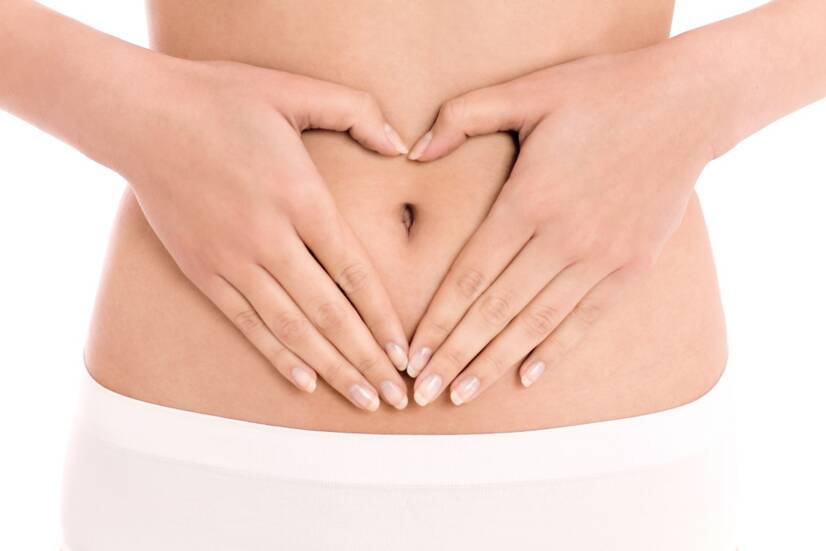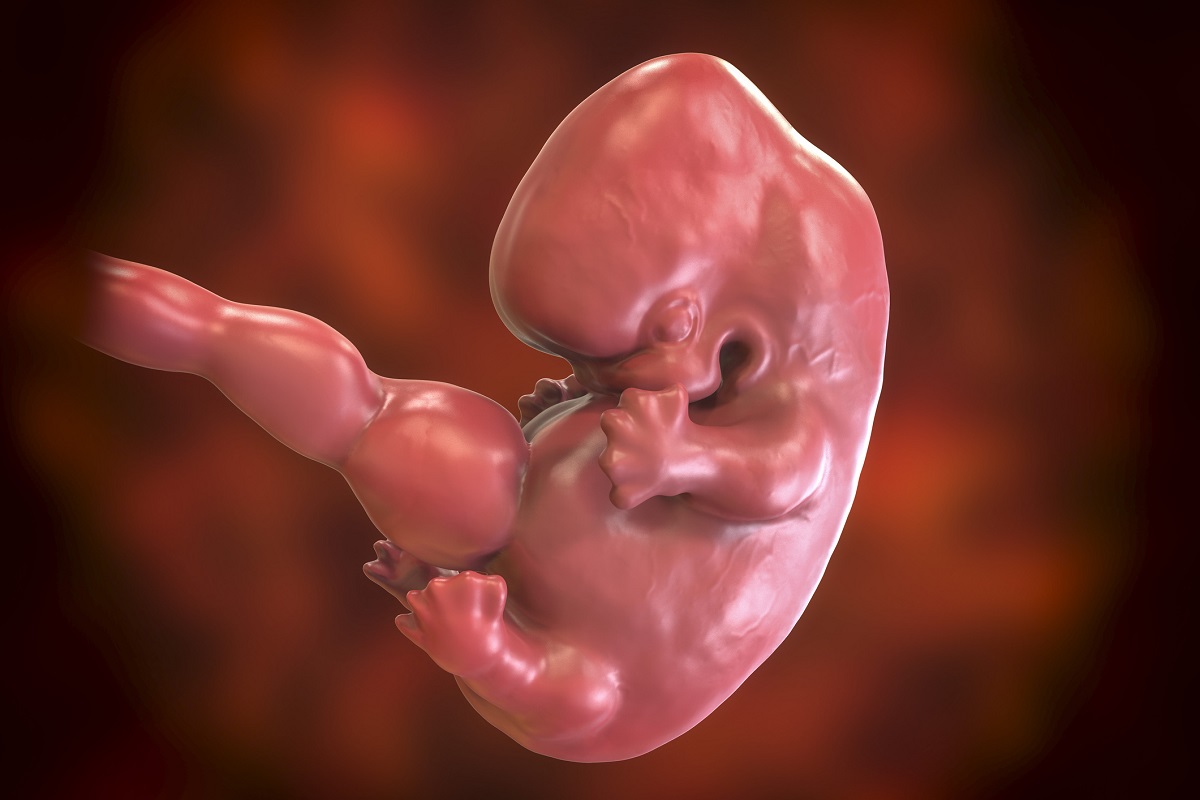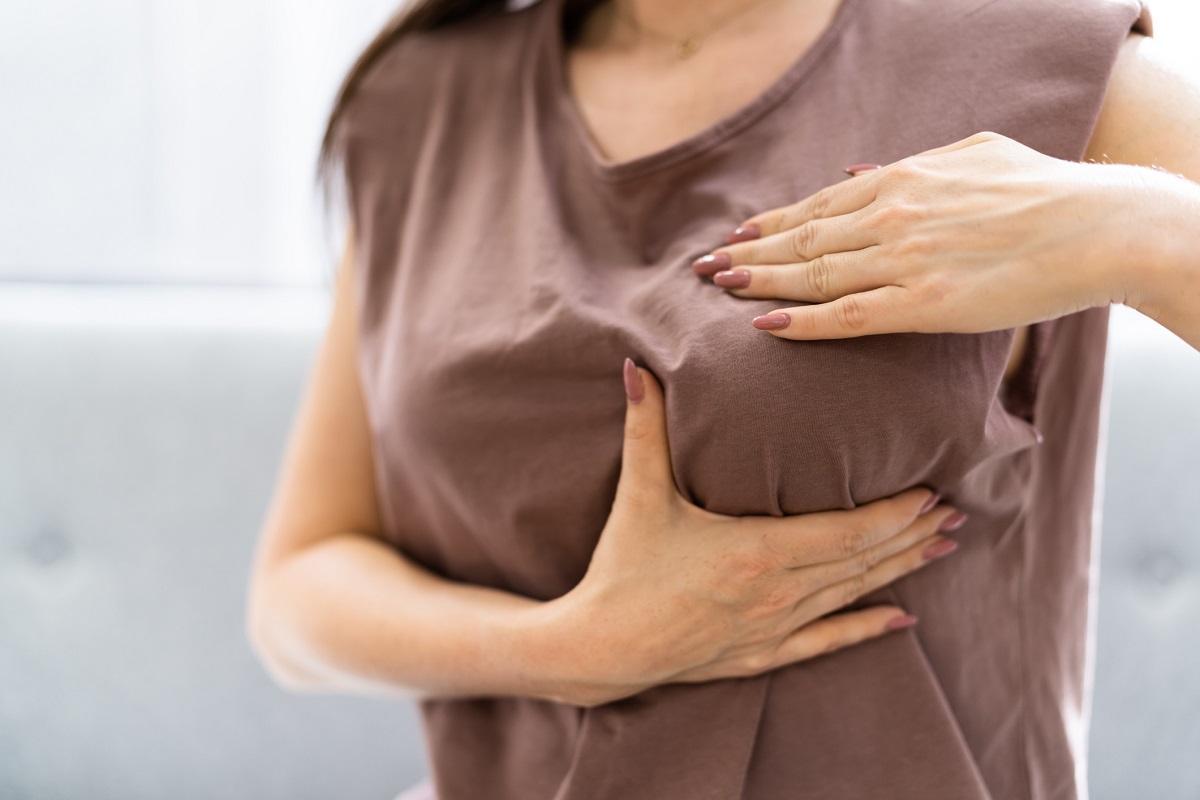- Pregnancy and childcare: Jane Symons
- Langman's Medical Embryology: Thomas W. Sadler
- nhs.uk - Week-by-week quide to pregnancy
- verywellfamily.com - Week 7 of Your Pregnancy
- whattoexpect.com - 7 Weeks Pregnant
- healthline.com - 7 Weeks Pregnant: Symptoms, Tips, and More
Week 7 of pregnancy: how does the embryo develop in this week?

Your baby is developing and growing in the womb. You are only seven weeks pregnant and nothing is visible on the outside. But your baby is growing at lightning speed.
Article content
It's been 7 weeks since your last period and 5 weeks since fertilization.
You're probably already looking in the mirror and are excited to see if your tummy is growing. So far, there are only small changes like breast growth and a feeling of a bloated tummy.
Your baby is very susceptible to external environmental influences during this period of rapid growth and development. Therefore, be careful, eat a healthy diet and avoid harmful substances so as not to endanger the developing foetus.
How is your baby developing in the tummy?
Even though it is only a very small miracle, it is already becoming an almost fully developed embryo. It is made up of millions of cells.
In this week, the embryo is also growing rapidly and developing all its systems.
At the beginning of the 7th week, its CRL (length from crown to coccyx) is approximately 8 mm and by the end of the 7th week it is up to 15 mm. Its weight is up to 1 gram.
You can read more about fetal size in the article:
Ultrasound in pregnancy: fetal size, what is fetal biometry?
Ultrasound clearly shows the yolk sac, umbilical cord and placental vessels.
The body, the head and the tail, which forms the future coccyx, are visibly discernible.

The head is large compared to the body.
The brain of the embryo grows faster. The head, which has a prominent forehead, also grows faster.
Brain cells are generated at a rate of 100 per minute.
The brain and spinal cord grow very quickly. Therefore, do not forget folic acid, which helps development and protects against congenital defects in fetal development.
Small depressions are visible where the ears and nose develop.
Its eyes cover the growing eyelids.
The development of the mouth and tongue has already begun.
The foundations of the digestive system, liver, reproductive organs, kidneys and lungs are already formed and continue to develop.
The kidneys are already in place and ready. Soon they will start producing urine.
Bumps are visible on the limbs from which fingers and toes are beginning to develop.
The cartilage forms as the basis of the bones of the hands and feet.
The amniotic sac is developed and begins to fill with amniotic fluid.
The 7.5-week-old fetus has already shown motor activity. You do not feel it yet because the embryo is still very small and its movements are still very weak.
The umbilical cord connects the fetus to the placenta and to you. The placenta delivers nutrients, oxygen and removes waste products from the fetus into your bloodstream. You then excrete them.
The heart is already beating at a rhythm of about 150 beats per minute.
How does a woman feel at 7 weeks pregnant?
Your uterus is starting to grow slowly. You can't see anything yet, but there are lots of new changes happening in your body.
You may have put on a few pounds or lost weight.
Read also:
How much to gain during pregnancy? What does it depend on and what to look out for?
Among the common symptoms of pregnancy are morning sickness. They can occur at any time of the day or even at night.
Vomiting and nausea occur in about 80% of mothers-to-be. Severe nausea and vomiting are less common but can put the woman and baby at risk.
Extreme nausea with vomiting is called hyperemesis gravidarium. It can lead to dehydration and weight loss. If you suffer from excessive nausea and vomiting, tell your gynaecologist.
Food cravings, as well as food aversions, are common in pregnancy. You may only have a few foods to choose from now that don't make you nauseous, but you don't have to worry that you're depriving your baby of nutrients. If, on the other hand, you have an increased appetite, try to eat more fresh vegetables and fruit.
Indigestion and heartburn. Your digestion is slowed down, so try to eat something easy to digest. Fatty, heavy and spicy foods cause heartburn, so try to avoid such foods to prevent discomfort.
Feeling bloated, gassy and constipated. The hormone progesterone relaxes the smooth muscles, thus affecting the intestines. The bowels move more slowly, more water is absorbed from the intestines and the stools are harder, leading to constipation.
You may experience lower abdominal cramps similar to menstrual cramps. But don't worry about the worst. Cramps are normal during the first trimester. But if they are accompanied by other problems, such as vomiting, contractions, dizziness, vaginal discharge, see your doctor or hospital as soon as possible. It may be an incipient miscarriage.
Your breasts are growing and are sensitive, sometimes even painful to the touch. Some women may have increased in size by as much as one size by the 7th week.

Your nipples begin to darken and enlarge.
The enlarging uterus puts pressure on the bladder. This causes you to have to urinate more often.
You may notice an increased vaginal discharge of a white milky colour called as leucorrhoea, which is normal.
During pregnancy, you are more prone to yeast infections of the vagina, which may appear in the form of itching, burning or discharge from the vagina. If you have any problem, tell your gynaecologist. The doctor will take a swab of your cervix and if you have an infection, he will prescribe gentle medicines for you and your baby.
You can read more about discharge in pregnancy in the article:
Discharge in pregnancy. What is considered normal discharge? And how does an infection manifest itself?
A mucus plug begins to form on the cervix, which will protect the fetus from bacteria entering the uterus.
Among the very common symptoms of pregnancy in the 1st trimester is increased fatigue. Your body is going through major changes and the placenta is forming in your uterus to nourish your baby.
Fatigue can be extreme and come with mood changes. Your pregnancy hormones are to blame for all of this.
There is more blood circulating in your body. This can cause pinker skin, which may be oilier and shinier than before pregnancy.
Skin and skin problems. Excessive dryness or, conversely, excessively oily, acne-prone skin. Use mild cleansers for oily skin and wash your face several times a day. If, on the other hand, you're concerned about dryness, use unscented, gentle moisturisers and body lotions.
You may have noticed that recently your hair has changed, thickened and is shiny. Even your nails have miraculously stopped breaking and become stronger.
You may also be experiencing headaches more often.
A metallic taste in your mouth.
A more sensitive sense of smell.
Excessive saliva production is common by the end of the first trimester. To relieve this feeling, try chewing gum.
If you notice any of these symptoms, visit the nearest hospital immediately:
- Bleeding or spotting
- Pinkish discharge from the vagina
- Pain or cramps in the lower abdomen or abdominal area
- Dizziness and lightheadedness
You can read about the symptoms of miscarriage in this article:
Miscarriage: what are the types and stages of miscarriage? What does miscarriage entail?
Visiting a gynaecologist in the 7th week of pregnancy
If your pregnancy has not yet been confirmed, your doctor will examine you at your next visit and confirm your pregnancy with an ultrasound.
He will check your blood pressure, weigh you and ask about your health, any illnesses, medications you are taking.
If you don't already have blood draws scheduled, he or she will schedule an appointment.
To monitor the progress of the pregnancy, the doctor will use a transvaginal probe through the vagina with an ultrasound machine to check the embryo, its viability by listening to its heart rate, its position in the uterus and measure its distance from the vertex to the coccyx - the CRL.
If everything is going well, your gynaecologist can issue you with a pregnancy booklet.
What we recommend and what to look out for
- Add fruit and vegetables to your diet. They are full of vitamins, filling and high in fibre to help you avoid constipation.
- Take prenatal vitamins and folic acid.
- Drink plenty of fluids to stay hydrated.
- Avoid heavy, fatty and spicy foods to avoid straining your digestion.
- Do not consume unpasteurized dairy products or raw or undercooked meat products.
- Do not drink alcohol, smoke or use harmful substances that could harm fetal development.
- Avoid aggressive cleaning agents when cleaning.
- If you feel tired, rest or take a nap during the day if possible.
- Do not lift heavy objects or strain or exert yourself.
- Light exercise is beneficial to energise you and keep you fit. A suitable exercise is pregnancy yoga.
- Being in the fresh air, walking in nature will help you recharge your energy and you will feel much better.
- Take care of your skin, which requires extra care during pregnancy.
- Wear a comfortable bra that won't push you down and cause breast pain.
Read also:
- Week 5 of pregnancy: is the baby's heart beating yet?
- How long does pregnancy last? How many days, weeks and months?
- Are you pregnant and are you suffering from lower abdominal pain?
- With folic acid to the longed-for baby and healthy blood vessels?
- In pregnancy, beware of anaemia. What are its causes, symptoms?
- What causes burning skin and what helps?
You can read more about fetal development in our article:
Pregnancyby weeks.
Gallery


Interesting resources
Related










